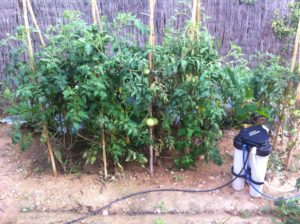Irrigation is one of the most important elements in urban garden care. The quality of vegetables and fruits, even their flavors, depend on what quality water you will use. Water is the basis for growing and gardening. But irrigating in a wrong way or with inappropriate water, can damage plants. To prevent this, you can follow some of the useful tips for watering your urban garden that we explain you in this article.
We tell you the 4 tips to irrigate your urban garden
1. Control the soil before plant
Before start planting your urban garden, you must keep in mind the kind of soil where we will sow the seeds, because depending on its features, water frequency and amounts can differ.
If you have sandy soil, must irrigate more frequently because this kind of soil doesn’t hold moisture well. On the other hand, if we have clay soil you must take care not to water in excess because we can rot the plants roots due to the high humidity.
2. Control the plants watering needs
It’s important to know the plants needs when we irrigate them, because not all plants in the urban garden need the same water care. Some will need more water, some less water, so it will be helpful to spread them in the plot according on their water needs:
-Leafy vegetables, like spinach, lettuce, cauliflower, Swiss chard…, they need a lot of water, so it’s important to irrigate them more frequently.
-Fruiting vegetables, like tomatoes, zucchini, cucumbers, capsicums…, they need moderate irrigation during the flowering stage. If they receive a lot of water while they are flowering, it could be harmful for their growth. Once they have borned fruit, you can go back to a regular irrigation.
-Onions, garlic and other similar vegetables need moderate watering.
-During summer and dry seasons, it is recommended to irrigate urban garden more frequently to prevent problems because of the lack of water, like dry leaves or damaged plants. It’s important to irrigate early in the morning or in the evening to protect plants from sun effects.
3. To use the appropriate irrigation system for our urban garden
There are different kind of irrigation systems for urban gardens. Depending on the plot area, the distribution of what we plant, and our irrigation needs, we have to decide which better fits into our plans to get our urban garden in the perfect conditions.
Watering with a Garden Hose:
If we have our garden on a terrace or small yard, this system is ideal and least costly. We should water like a soft rain, so that the water pressure doesn’t remove the nutrients from the soil and also keeping in mind that in many cases it is counterproductive to water the plants leaves.
If we have a bigger urban garden and we don’t have appropriate hose and not enough time to irrigate by hand, there are other automated systems that will distribute the water around all the plot easily:
Sprinkler irrigation:
this system use sprinklers that distribute the water around the garden like rain. If you want to use this system, you need a good water pressure so that water arrives everywhere on the plot. This irrigation system allows you to program the irrigation, and guarantee that the water will arrive to all the plants in the same measure.
Drip irrigation:
this automated system uses water more optimally and avoids loss of nutrients in the soil. That’s why is the most recommended for urban gardens. Water is infiltrated to the roots plants by a pipe system and drips around the garden.
4. Use quality water for irrigation
 We can follow the irrigation advice previously written to achieve the best results, but if we do it with chlorinated water we won’t get them. Vegetables and fruits won’t be of such quality as we want, because chlorine will interfere on the results.
We can follow the irrigation advice previously written to achieve the best results, but if we do it with chlorinated water we won’t get them. Vegetables and fruits won’t be of such quality as we want, because chlorine will interfere on the results.
All municipal water supplies contain chlorine, a chemical disinfectant used to kill off deadly bacteria and virus in the water supply, especially in summer. We know our tap water contains chlorine because of the smell and the taste. If we are growing our own food because we are looking for healthier and organic quality fruits and vegetables, with genuine flavor, it makes no sense to irrigate them with chlorinated water. We need the best water quality posible to achieve organic results and authentic taste.
Besides of this, watering our urban garden with chlorinated water will not only damage the vegetables final quality, but also cause growing problems in plants, like burned roots, yellow leaves, problems with compost… To get quality water, free of chemicals and pesticides, you can use water filtration systems, which eliminate chlorine up to 99%, and also reduce the herbicides, pesticides and other contaminants.
If the water also has a high concentration of mineral salts (hard water) this can be a problem too, because high mineral water can harm your plants and vegetable final quality. In this case, you can install a garden reverse osmosis system, which will eliminate up to 95% of salts and heavy metals dissolved in the water.
These filtration and reverse osmosis systems come with easy indoor and outdoor connections to the tap and the garden hose and even to the water tanks, and are easy to adapt to other irrigation systems. They are also available with different flow capacity, for small, medium or even industrial size gardens.
At GrowMax Water we are specialists in water systems for hydroponics and gardening. Visit our website and inform yourself about how these systems could help you to maintain a healthier urban garden. They are great for organic growers who want organic vegetables and fruits, with the best final quality.


